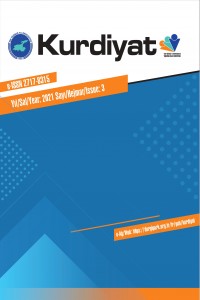Review And Investigation of Mardin Social History in the Ottoman Sheriat Court Registry in No. 238 ind Date 1865
Abstract
ABSTRACT
The social life in Kurdish regions has been characterized by its diversity and richness in different cultures. Such characteristics have expressed the various components including the impact of peaceful coexistence based on the acceptance of the other. This has included multiple races، languages and traditions، although it has been dominated by the Kurdish character in the majority. Further, Kurdish regions has contained heavenly and non-heavenly religions that have been rooted in the region from the first human settlement and different civilizations. All of these have led to richness of Kurdish regions social heritage.
The current paper sheds light on different samples of the nature of social life and pictures of the diaries experienced by the people of Mardin, one of the important historical Kurdish cities and its areas. One of these topics is thecomplaints raised by the inhabitants of those areas to each other. Through these complaints, focus is put on some various issues such as the identification of the old names of residential neighborhoods of the city of Mardin and the cities that were administratively affiliated with it, the old names of the Kurdish villages, which were mostly changed after the establishment of the modern Turkish Republic، as well as the reasons behind marital problems and divorce cases، theft cases and problems related to inheritance، debt and other social issues of this kind. On the other hand،these complaints reflect the demographic structure of the region, religions embraced by its inhabitants, the names of plaintiffs and witnesses, the names of tribes living there, and other information that has its special importance to the social part of the history of modern Kurds in the second half of the 19th century.
Keywords: Mardin, Divorce, Marriage, İnheritance, debt.
Keywords
References
- Milli Kutuphanesi Baskanlgi, Mardin, Mardin Seriye Sicilli, Demirbas No: 238, Makrofilm No: 7167, Cekildigi Yil: 1998. 1. Tahir sezen,osmanli yer adlari (alfabetik sirayla)(Ankara:2006). 2.Kanunname-I Sultani li-aziz Efendi,Rhoads Murphey,(Harvard University : 1985). 1. Abdullah demir,dogu ve guneydugu anadolu'nun osmanli devletine iltihaki, kopru dergisi sayi , no 98, bahar:2007. 2. Mustafa Fırat Gül, Aksaray Şehrinin İktisadî Tarihi Hakkında Bir Deneme, çاanakkale Araştırmaları Turk Yıllığı Yıl: 11, Bahar 2013, Sayı: 14, ss. 137-140.
Abstract
Keywords
References
- Milli Kutuphanesi Baskanlgi, Mardin, Mardin Seriye Sicilli, Demirbas No: 238, Makrofilm No: 7167, Cekildigi Yil: 1998. 1. Tahir sezen,osmanli yer adlari (alfabetik sirayla)(Ankara:2006). 2.Kanunname-I Sultani li-aziz Efendi,Rhoads Murphey,(Harvard University : 1985). 1. Abdullah demir,dogu ve guneydugu anadolu'nun osmanli devletine iltihaki, kopru dergisi sayi , no 98, bahar:2007. 2. Mustafa Fırat Gül, Aksaray Şehrinin İktisadî Tarihi Hakkında Bir Deneme, çاanakkale Araştırmaları Turk Yıllığı Yıl: 11, Bahar 2013, Sayı: 14, ss. 137-140.
Abstract
Osmanlı devleti döneminde kürt bölgelerinde sosyal ve toplumsal hayat renga reng ve çeşitlilikle doluydu, ayrı ayrı kültürlere entellektüellere ev sahipliği yapan bir devlet olmuştu, bu çok çeşitlilik ve entellektüelliğin meydana getirdiği sonucu göz ününe alırsak bunu en büyük belge olarak nitelendirebilirız, bunun neticesine bakarsak kürt bölgesinde birbirlerini kabullenen çeşitli ırk ve milletleri gururuz hal böyle olduğu alde sakin emniyet içinde bir yaçam vardı, bu yüzden kürdistanda ayri ayrı diller, irklar, milletler gelenek ve görenekler yaşam surmekteydıler, ama bu saydıklarımızın en fazla ve yaygın olan kürt milleti ve diliydı, ayrıca kürt bölgesi ayrı dinlerin oğrak yeridi, semavi dinlerden-ibrahimi dinlerden tutun bu kategoride olmayan dinlere kadar her çeşitten inanç ve dinleri bağrında bağrındıriyordu, buda bu kürt bölgesinin nekadar eskiden beri insanlığa ev sahipliği yaptının en büyük göstergesidır, ayrica çok fazla oygarlıklar burada kurulup yok oldular, bu nedenden dolayı bu topraklar çok kültürlü toplumsal bakımında çok zengin ve çeşitliliğe sahib bir bölgedır.
Bu çalışmada biz toplumsal tarihden bahsediyoruz, mardin şehrinin gündelik hayatından bahsedip ve toplumsal hayatın nasıl olduğunu anlatiyoruz, mardin kürt bölgesinin en eski şehirlerinden biridır, bu çalışma(1228h-1865m)çıkmış bir(Osmanlı şer’iyye sicilli)ye dayandırarak yapılmış, bu sicilde çok fazla konu var bu konuların başında mardin halkı ve cıvarlarının birbirlerini şikayet eden dilekçeler var, ayrıca bazı gündelık sorunları içeren öğrenkler ve bilgiler var, örneğin(mardinin eski sokak isimleri, idari bakimda mardine bağlı olan yerler, mardine bağlı civar köylerin isimleri, ayrıca evliliklerle ilgili olan sorunlar, boşanmalar, boşanmalara neden olaylar, hırsızlık olayları, hırsızlığın çeşitleri ve nasıl işlendiği, miras sorunları ve borç almalar)içeren bir sicildır, bu şer’iyye defterinde, bu sorunlar mardin şehri ve civarlarında yaşayanların arasında sorunları meydana getirmekteydı.
Anahtar kelimeler(boşanmalar, evlilik, miras ve borçlar).
References
- Milli Kutuphanesi Baskanlgi, Mardin, Mardin Seriye Sicilli, Demirbas No: 238, Makrofilm No: 7167, Cekildigi Yil: 1998. 1. Tahir sezen,osmanli yer adlari (alfabetik sirayla)(Ankara:2006). 2.Kanunname-I Sultani li-aziz Efendi,Rhoads Murphey,(Harvard University : 1985). 1. Abdullah demir,dogu ve guneydugu anadolu'nun osmanli devletine iltihaki, kopru dergisi sayi , no 98, bahar:2007. 2. Mustafa Fırat Gül, Aksaray Şehrinin İktisadî Tarihi Hakkında Bir Deneme, çاanakkale Araştırmaları Turk Yıllığı Yıl: 11, Bahar 2013, Sayı: 14, ss. 137-140.
Details
| Primary Language | Turkish |
|---|---|
| Subjects | Creative Arts and Writing |
| Journal Section | Research Articles |
| Authors | |
| Publication Date | June 20, 2021 |
| Submission Date | February 25, 2021 |
| Acceptance Date | March 22, 2021 |
| Published in Issue | Year 2021 Issue: 3 |
Kurdiyat is licensed under a Creative Commons Attribution-NonCommercial 4.0 International Licence.


